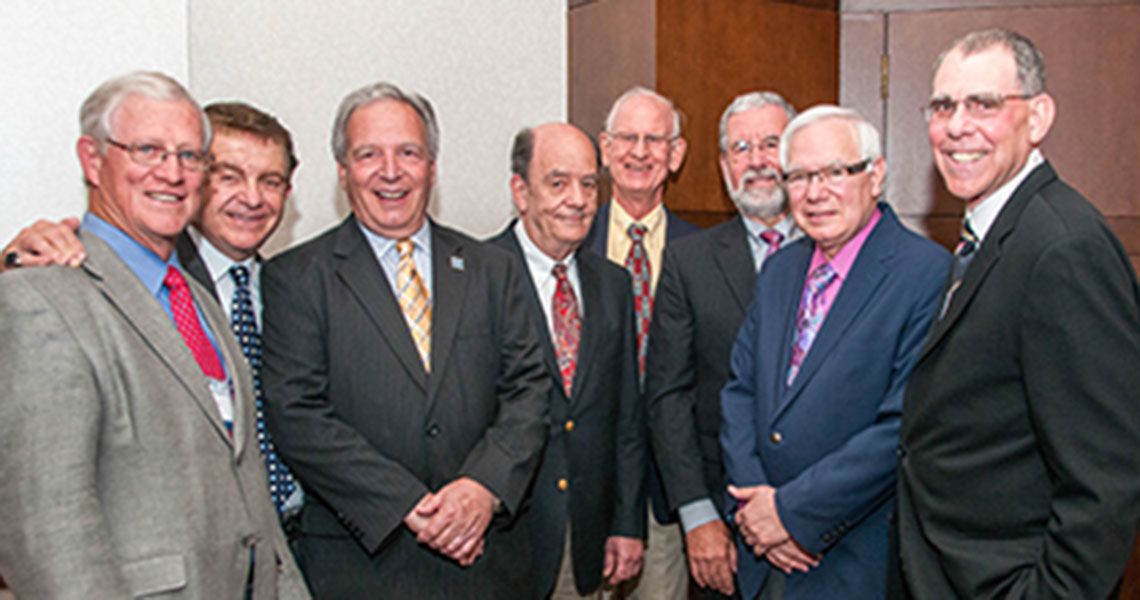Class pride runs deep in the culture of GW, and the Class of ’68 at the School of Medicine and Health Sciences (SMHS) has a particularly good reason to be proud. To date, the class has donated more than $1.1 million to GW. That amounts to $23,900 a year, give or take.
While the total gift amount is impressive in and of itself, what makes this story even more remarkable is the class’s high participation rate. Among the 108 alumni, 90 percent have given to GW, donating more than 1,400 gifts since 1968. It’s proof that many small to moderate-sized gifts can be as significant as larger, but more scarce, donations.
Among the dedicated members of the Class of ’68 is cardiologist David B. Williams, M.D. After graduation, he served two years in the Air Force before accepting a position at Kaiser Foundation Hospital in California. He went on to become Chief of the Department of Medicine at Kaiser, where he served for 25 years. Now retired from Kaiser, Williams continues to treat patients once a week at La Clínica, a health center that specializes in delivering culturally appropriate care to diverse populations. Williams also mentors medical students at Touro University in Vallejo, CA.
“We have a class of great students who really appreciate GW, and want to maintain the quality of the school,” says Williams. He notes that everyone benefits by donating to GW – alumni help their own reputation by maintaining their alma mater’s prestige.
Though Williams has not made it back on campus since graduation, he stays up to date on the changes and progress happening at SMHS. He sees the school as staying aligned with the evolution of modern medicine as a whole.
“I think medicine in general has moved in the direction of being based more on science and evidence,” Williams says. “The quality of medicine, and our knowledge of it, is vastly greater now than it was back then. We now have guidelines based on evidence that allows doctors to give higher quality medicine. There’s been amazing advances in technology, as well.” “GW has been very involved in that.”
Another highly dedicated Class of ’68 alumnus is Allan W. Lohaus, M.D. After graduation, Lohaus went to a rotating internship, followed by two years of alternative services at an inner city health center in Louisville, KY. Later, he served a residency in obstetrics and gynecology at Sinai Hospital in Baltimore, MD, and then went into private practice in Columbia, MD. He was also a clinical faculty member at the Johns Hopkins University.
For Lohaus, the reason why the Class of ’68 is so dedicated to giving back is because alumni have an awareness of what they received. The scholarships, loans, and employment opportunities that accompanied a GW education is something for which he is extremely grateful. He was able to attend GW thanks to a scholarship, and he often designates his own gifts toward student scholarships. “I think the term that’s used now is ‘pay it forward,’” he adds. It’s a concept that’s familiar to him. Lohaus was profoundly impacted by a prolonged illness. The experience was the inspiration for a memoir, “Mayday: A Physician as Patient,” which was published in 2006.
Like Williams, Lohaus has made a bequest intention to the school. “Part of my life’s success is because of my GW med school experience,” he said. “I want to acknowledge that in a significant way.”
Six members of the Class of ’68 have acknowledged GW’s contribution to their careers in another way. They each can count their children among GW’s medical alumni; a powerful testament to the quality of medical education SMHS offers according to Lohaus. “I had the pleasure of having both a niece and close friend graduate from GW in the last six years. So I’ve had my finger on the pulse of how they were educated, and I’m delighted.”
While breaking a million dollars in donations is an incredible achievement, the class shows no sign of resting on its laurels. Both doctors have words of advice to their classmates on how to keep up the pace.
“I think you stay connected with GW and let that be your inspiration for giving,” says Lohaus.
“If we all gave a little bit, it amounts to a lot,” says Williams. “And it’s a relatively painless thing to do.”



